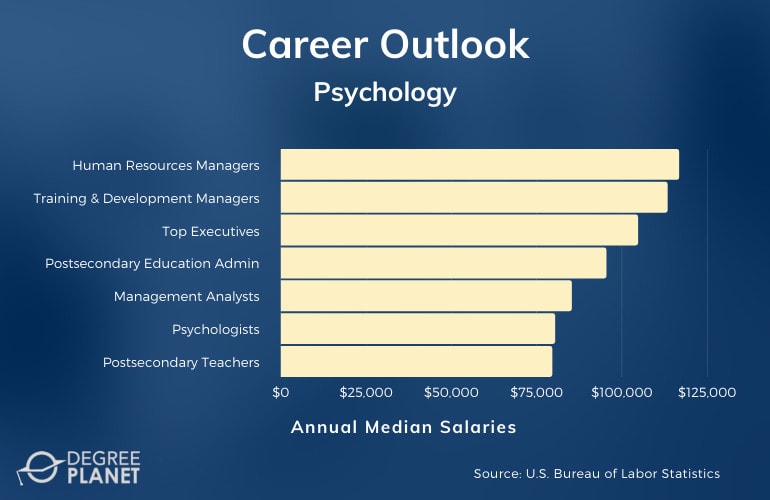What can you do with a masters in psychology? Psychology is a lucrative field with many opportunities for advancement.

Some of these doors might not be open to you, though, without the right qualifications.
Editorial Listing ShortCode:
A master’s degree in psychology can help establish you as a credible professional in a competitive job market.
What Can You Do with a Masters in Psychology?

Psychology is the study of the human mind, but there’s a lot more to it than sitting on a couch and asking people about their feelings.
There are many ways to specialize in psychology, so you can follow your interests into a wide range of disciplines. You can study child psychology, forensic psychology, addiction psychology, developmental psychology, and more.
You can also find jobs in non-psychological fields that will utilize the people skills and research background that you obtain from a graduate-level psychology program. For example, you may become a social worker, human resources manager, business development leader, or university professor.
Editorial Listing ShortCode:
One thing to note about psychology careers is that they can require additional schooling beyond the master’s level.
If you’re interested in counseling psychology, for example, you’ll likely need a Doctor of Philosophy (PhD) or Doctor of Psychology (PsyD). You might also need to obtain professional licenses or certifications after graduation. Getting a masters degree can be a crucial step toward these long-term goals.
3 Things You Can Do with a Master’s Degree in Psychology
Even if you aren’t planning to pursue a career as a psychologist, psychology graduate programs can prepare you for many jobs in related fields.
1. Human Resource Manager

Human resources is an ever-growing field with a number of specializations, including training, recruitment, and compensation and benefits. A master’s degree in psychology can complement any of these paths.
The practical courses can teach you about the administrative side of the job, including researching and organizing data. The specialty courses can prepare you for things like mediating conflicts, analyzing productivity studies, and developing training programs for staffers.
2. Industrial or Organizational Specialist

These jobs take psychological science and apply it toward workplaces or other organized settings. Since it’s a broad field, there are many ways to specialize.
You might focus on productivity, for example, and become an organizational effectiveness manager. Another option is specializing in business development for start-ups as a consultant or executive coach.
3. Postsecondary Teacher

If you love psychology as a concept, you might enjoy a career that involves teaching it to others. While there are some jobs on the K-12 level, the most lucrative positions are in universities.
According to the Bureau of Labor Statistics, psychology college professors make an average of $78,180 per year. A career in academia would also give you the chance to research and publish your own work in addition to running studies and trials.
As you can see, you may have a variety of career options with a master’s degree in psychology. It all depends on what you want to do and where you want to work.
Common Psychology Master’s Specializations

Many people who study psychology choose to specialize. It isn’t necessarily required, but it can lead to training and skill building in preparation for entering the workforce as a qualified job seeker.
- Social Psychology: Frequently studied with sociology, this field examines human behavior and how it’s impacted by groups, communities, and societies.
- Educational Psychology: This field is the study of how people learn, and it can be useful to everyone from educators and administrators to business consultants and software developers.
- Forensic Psychology: With a focus on crime, this specialization can lead to a variety of job opportunities in legal and law enforcement fields.
- Counseling Psychology: This field of psychology can involve counseling kids, couples, individuals, addicts, inmates, business professionals, and more.
- Media Psychology: A relatively new field, media psychology focuses on how media and technology impacts human behavior, so it can be a useful specialization for consultants, marketers, and media managers.
There are also different opportunities within these fields, depending on whether you’re interested in clinical psychology or applied psychology.
Psychology Careers & Salaries

According to the Bureau of Labor Statistics, psychologists make an average of $82,180 per year.
Editorial Listing ShortCode:
The top performers in the field can earn more than $137,590 per year. That said, you don’t have to become a psychologist just because you study psychology in school. There are other career possibilities as well.
| Careers | Annual Median Salaries |
| Human Resources Managers | $121,220 |
| Training and Development Managers | $115,640 |
| Top Executives | $107,680 |
| Postsecondary Education Administrators | $97,500 |
| Management Analysts | $87,660 |
| Psychologists | $82,180 |
| Postsecondary Teachers | $80,790 |
| School or Career Counselors | $58,120 |
| Social Workers | $51,760 |
| Social Science Research Assistants | $49,210 |
Some of these jobs might require additional schooling beyond a masters degree. A masters is usually the minimum level of education required by employers and licensing boards. Most masters programs require an undergraduate degree in the field, so if you want to get started more quickly, you can consider earning one of the fast psychology degrees online offered by a growing number of universities.
How Much Money Can You Make with a Masters in Psychology?

The best-paying jobs in psychology are usually in business settings. Human resource managers, for example, earn six figures per year. So do high-level executives with experience in consulting, training, recruiting, or creating programs related to industrial and organizational development.
If you don’t care for the corporate world, you may also make good money as a private psychologist for various fields. You can charge your own rates for counseling clients or consulting with businesses.
What Is a Masters in Psychology Good For?

Psychology careers for master’s graduates can cover a wide range of interests. If you’re interested in law enforcement, for example, one career you can do with a masters in forensic psychology is to become a forensic psychologist. If you’re good with kids, you can study child development and advocacy, or you may become an educational psychologist for K-12 schools.
There are also quite a few careers in the social sciences where a psychological background can come in handy. You may find work as a counselor, case manager, social worker, addiction specialist, and more.
What Do You Learn in Masters in Psychology?

You don’t always need a background in psychology to enter grad school for it. Some schools will admit bachelors degree holders in any field.
You’ll be expected, though, to fill in all of the gaps in your psychology knowledge. Courses might include everything from entry-level organizational behavior to graduate-level pharmacology.
Editorial Listing ShortCode:
It can also help to prepare for rigorous research courses leading up to your final dissertation. Depending on your areas of interest, you might need to complete various projects, internships, and clinical hours.
What Degree Do You Need to Become a Psychologist?

A masters degree is usually the minimum requirement for a career in psychology. You might need a Doctor of Philosophy (PhD) or Doctor of Psychology (PsyD) for very competitive fields.
In addition to traditional full time programs, a growing number of universities offer part time PhD and part time PsyD programs for working students.
Additionally, most states will require licensure before you can practice. You might need to sit for exams, complete a certain number of clinic hours, or obtain special certifications to prove your qualifications. It can be beneficial to research these requirements when mapping out your post-graduation plan.
Not only can it help you avoid unexpected curve balls in the future, but you might be able to arrange practicums and clinic hours that count for both your degree and your future license.
How Long Does It Take to Get a Masters in Psychology?

Masters programs often take 1 to 2 years to complete. With graduate degrees in psychology, though, how long it takes you to complete depends on what you’re studying and whether there are any special requirements for your specialty.
If you’re studying applied psychology, for example, you’ll need a certain number of clinical hours under your belt before you can graduate.
What Is the Difference Between an MA vs. MS in Psychology?
You can earn either a Master of Arts or a Master of Science in Psychology. While many of their courses and credit requirements will overlap, there’s a distinction in their areas of focus.
A Master of Arts tends to lean towards liberal arts and the humanities while a Master of Science is usually more focused on science- and research-based work. Both degrees will meet industry requirements for licensure. An M.A. or M.S. is ultimately just a personal preference, depending on how you want to spend your time in school.
Is a Masters in Psychology Worth It?

Yes, a masters degree in psychology is worth it for many students. The Bureau of Labor Statistics is projecting 5% job growth in life, physical, and social science occupations over the next 10 years.
Common psychology careers in this field include psychologist, counselor, business consultant, social worker, and postsecondary educator. You can also find work in many different settings, including schools, businesses, rehabs, prisons, government agencies, and private offices.
Getting Your Masters in Psychology Online

If you’re interested in the human mind, you may consider pursuing a masters degree in psychology. A masters in psychology can lead to high-paying jobs in a variety of fields. It can also serve as a foundation for further education if you decide to obtain a PhD or PsyD.
A masters degree can also open doors in other, related fields. If you’re thinking about a job in education, business, technology, or law enforcement, a psychological background can be advantageous in those fields as well.
To begin the next step in your educational journey, you may consider reaching out to accredited universities and inquiring about their online graduate programs for psychology.

